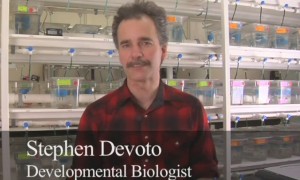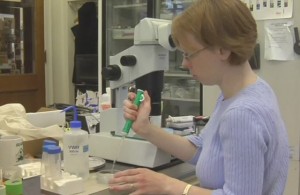Hingorani, Bricca Explain Science Documentary Filmmaking Class in ASBMB Today

Manju Hingorani, associate professor of molecular biology and biochemistry, and Jacob Bricca, adjunct assistant professor of film studies, explained their experimental cross-disciplinary course on science documentary filmmaking at Wesleyan in a December 2010 article published in American Society for Biochemistry and Molecular Biology (ASBMB) Today.
In the article, Hingorani and Bricca wrote about their course, “Making the Science Documentary,” which they co-taught together, starting in 2007. The course was designed to introduce undergraduate students to the life sciences and to documentary filmmaking to teach them the skill and art of communicating science-related topics through visual media. The students, for the most part, were non-science majors with little or no prior filmmaking experience.
Katie Johns’ ’09 video titled “It’s Hard to be a Clone” and Rosemary Ostfeld’s ’10 video titled “Muscles in Motion” are included in the ASBMB Today online article.

“We wanted students to learn about biology at the molecular through organism levels and, just as importantly, to learn about how science is done by getting an inside look at the fascinating world of life science research,” Bricca and Hingorani explain.
In order to achieve this goal, Hingorani recruited four Wesleyan professors as potential subjects of the students’ documentary films: Ishita Mukerji and Scott Holmes of the Molecular Biology and Biochemistry Department, who work on protein structure/function and transcriptional regulation, respectively, and Stephen Devoto and Janice Naegele of the Biology Department, who work on cellular development and neurodegeneration related to epilepsy, respectively. Manju taught students the scientific concepts and content necessary to engage intellectually with the research. Students also had full access to personnel in the scientists’ laboratories, including their own undergraduate peers who worked there as research assistants.
Bricca taught students technical filmmaking skills such as composition, interviewing techniques, lighting and editing, and showed short science documentaries to analyze relevant models of non-fiction filmmaking.
The course will be offered again in spring 2011, this time with Suzanne O’Connell, associate professor of earth and environmental sciences, director of the Service Learning Center, who will focus on environmental studies, specifically sustainability issues related to the production and distribution of food.
“We are looking forward to future iterations of the course that take on a variety of scientific disciplines,” Hingorani and Bricca say in the article.

